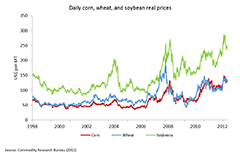Food price volatility can present problems for an array of stakeholders, including countries managing their export portfolios, commodity traders, and especially farmers, as unpredictable prices may result in variable income and food insecurity.
Unstable food prices in 2007, 2008, 2010, and 2011 attracted the attention of policymakers and researchers hoping to explain the seemingly precarious market. The co-movement of commodity prices—that is, prices moving in tandem, despite each commodity having different causes of the observed price fluctuations—continued to puzzle researchers. If market interactions across various agricultural commodities do exist, they should be considered when analyzing the pricing behavior of these commodities.
In their discussion paper, Market Interdependence and Volatility Transmission among Major Crops, IFPRI researchers Manuel Hernandez and Miguel Robles, and colleague Cornelis Gardebroek, examine price volatility transmission across the US wheat, soybean, and corn markets on a daily, weekly, and monthly basis. The examination of data from these different time spans is key to building a broader view of the trends, dynamics, and interrelationships at play.
Focusing on the 1998-2012 period, the authors evaluated the dynamics of food price volatility among major agricultural commodities and whether or not volatility in certain crops leads to volatility in other crops. They also examined whether the level of interdependence between agricultural commodity markets has increased during this time period.
They found that volatility transmission occurred across commodities—particularly at the weekly and monthly levels—and that wheat and corn markets play a major role in terms of volatility spillovers. Specifically:
- When examining data at the monthly level, volatility spillover from wheat becomes stronger and that from corn to other markets becomes weaker;
- A shock in the wheat market is closely correlated to an equal or greater shock in the corn and soybean markets;
- A price shock in the corn market produces a similarly-sized shock in the soybean market and a lesser one in the wheat market;
- The transmission of volatility from soybeans to corn and wheat is low and the volume of the shock is usually less than half the soybean shock;
- Volatility transmission is generally not observed at the daily level.
Lastly, the researchers found that despite the interactions between markets on a weekly and monthly basis, the level of interdependence between commodities in recent years is similar to the level observed in the late 1990s.
Related materials







